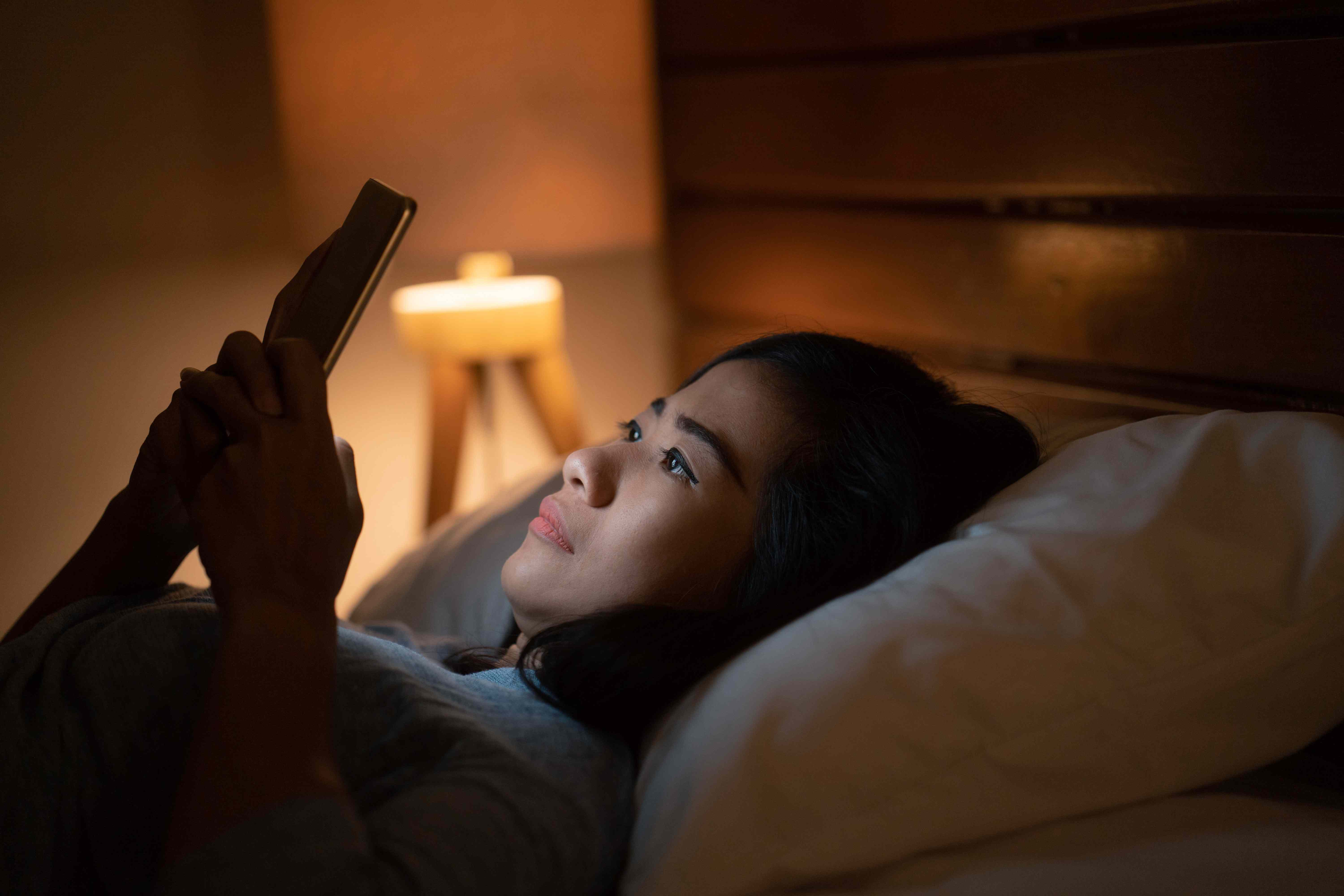Does Shifting Your Phone to Red Light Really Help You Sleep Better? But is shifting to red light any better? Here's what experts say

At night, the blue light from your phone can trick your brain into thinking it's still daytime

ferlistockphoto / Getty Images
- Blue light from your phone can delay sleep by tricking your brain into thinking it’s still daytime.
- Switching your phone to a red light filter may help, but avoiding screens before bed is best.
- Experts suggest using red light or night modes, limiting exciting content, and cutting off screen time two hours before bed.
If you’re like most Americans, you probably scroll through your phone at bedtime. But that endless scrolling doesn’t just replace sleep time—screens also emit blue light, which stimulates the brain and makes it more difficult to wind down.
To counteract this, you might be interested in trying a red light filter, an alternative offered on many smartphones that blocks blue light. But can red hues actually help you get better sleep? Health spoke to three sleep physicians to find out.
How Do Screens Affect Your Sleep, Anyway?
There are two key reasons your phone keeps you up at night. The first: the light that shines from your device.
Light governs the body’s circadian rhythm, or natural 24-hour clock. Our brains interpret light as a signal to stay awake and darkness as a cue to fall asleep.
Blue light, the type emitted by phones, sends an especially strong signal to the brain. During the day, it can boost alertness, mood, and productivity, research shows. But at night, it tricks your brain into thinking it’s seeing the sun or a bright, blue afternoon, said Alex Dimitriu, MD, a psychiatrist, sleep medicine physician, and founder of Menlo Park Psychiatry & Sleep Medicine.
This delays the natural melatonin surge that helps signal it’s time to sleep, said Robert Satriale, MD, FAASM, a sleep specialist at Temple Health. Research shows that just two hours of blue light exposure can reduce melatonin levels by roughly 22%.
The second reason your phone might delay sleep is the content it's providing. “It’s too darn exciting,” Dimitriu said. Each reel, story, and notification triggers the release of dopamine, a neurotransmitter that promotes wakefulness, according to Satriale. All of that excitement keeps your brain active, making it more difficult to fall asleep.
Can Red Light Actually Help You Get More Sleep?
Unlike blue light, which dupes your brain into thinking it’s daytime, red light makes your brain think the day is ending. It sends a signal that the sun is setting, according to Dimitriu, and is less likely to impair the release of melatonin.
Whether red light filters really make a difference when it comes to sleep, however, isn’t entirely clear. The research is mixed—and therefore inconclusive. But the bulk of evidence suggests that using a red filter may be beneficial.
That said, no light at all is ideal, said Michael Jaffee, MD, FAAN, FANA, the chair of the University of Florida Department of Neurology.
How to Activate Your Phone's Red Light Filter
You might not have known about it, but the red filter has been an option on iPhones since 2016. To switch to it, follow these steps:
- Open up Settings
- Click Accessibility
- Tap Display & Text Size
- Hit Color Filters
- Click Color Tint
- Toggle to the right until your phone has a deep red hue
What Else Can You Do To Get Better Sleep?
Research shows that the most effective way to prevent your phone from disrupting your sleep is to limit its use at night. Aim to ditch your phone about two hours before you plan to sleep.
If you can’t quit scrolling, the next best thing is to turn your phone’s brightness all the way down. “Your eyes will get used to it, your sleep will thank you,” Dimitriu said.
In addition to using the red filter at night, you can activate Night Shift, a feature that automatically gives your screen a warmer hue at the same time every night. To set it up, go to Settings > Display & Brightness > Night Shift, and then set the time you want it to activate each night. Gray Scale Mode, which strips all color from your screen, can also make your phone less stimulating, noted Satriale.
Finally, avoid content that’s too exciting—that means alarming news, intriguing Reddit posts, violent movies. As Dimitriu put it, “boring is good.”
Edited by Health with a background in health, science, and investigative reporting. Previously, she wrote full time about parenting issues for the app Parent Lab. Before that, she worked as a reporter for National Geographic covering wildlife crime and exploitation." tabindex="0" data-inline-tooltip="true"> Jani Hall Jani Hall
Jani Hall is a news editor for Health with a background in health, science, and investigative reporting. Previously, she wrote full time about parenting issues for the app Parent Lab. Before that, she worked as a reporter for National Geographic covering wildlife crime and exploitation.
learn more
Read more:
Jani Hall
Jani Hall is a news editor for Health with a background in health, science, and investigative reporting. Previously, she wrote full time about parenting issues for the app Parent Lab. Before that, she worked as a reporter for National Geographic covering wildlife crime and exploitation.
learn more
Read more:
This story originally appeared on: Health News - Author:Julia Ries


















